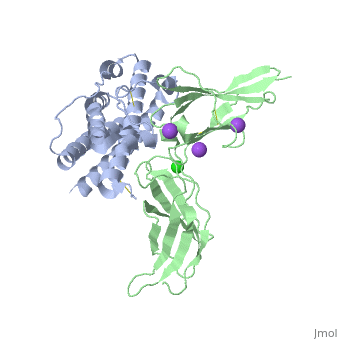Prolactin: Difference between revisions
Michal Harel (talk | contribs) New page: <StructureSection load='3mzg' size='340' side='right' caption='Human prolactin (grey) complex with prolactin receptor extracellular domain (green) (PDB code 3mzg).' scene=''> == Fun... |
Michal Harel (talk | contribs) No edit summary |
||
| (5 intermediate revisions by the same user not shown) | |||
| Line 1: | Line 1: | ||
<StructureSection load='3mzg' size='340' side='right' caption='Human prolactin (grey) complex with prolactin receptor extracellular domain (green), Na+ (purple) and Ca+2 (green) ions (PDB code [[3mzg]]).' scene=''> | |||
<StructureSection load='3mzg' size='340' side='right' caption='Human prolactin (grey) complex with prolactin receptor extracellular domain (green) (PDB code [[3mzg]]).' scene=''> | |||
== Function == | == Function == | ||
'''Prolactin''' (PRL) is a hormone which has numerous effects. It enables females to produce milk. PRL provides the body with sexual gratification. PRL promotes neurogenesis in maternal and fetal brains. PRL stimulates cells which are responsible for the formation of myelin coating on axons<ref>PMID:11015620</ref>. | |||
See also [[Prolactin (Hebrew)]]. | |||
== Disease == | == Disease == | ||
PRL has immunomodulatory effect and plays a role in lupus and rheumatoid arthritis<ref>PMID:17465339</ref> | |||
</StructureSection> | </StructureSection> | ||
== 3D Structures of | == 3D Structures of prolactin == | ||
Updated on {{REVISIONDAY2}}-{{MONTHNAME|{{REVISIONMONTH}}}}-{{REVISIONYEAR}} | Updated on {{REVISIONDAY2}}-{{MONTHNAME|{{REVISIONMONTH}}}}-{{REVISIONYEAR}} | ||
Latest revision as of 10:34, 7 October 2020
FunctionProlactin (PRL) is a hormone which has numerous effects. It enables females to produce milk. PRL provides the body with sexual gratification. PRL promotes neurogenesis in maternal and fetal brains. PRL stimulates cells which are responsible for the formation of myelin coating on axons[1]. See also Prolactin (Hebrew). DiseasePRL has immunomodulatory effect and plays a role in lupus and rheumatoid arthritis[2]
|
| ||||||||||
3D Structures of prolactin3D Structures of prolactin
Updated on 07-October-2020
1rw5 – hPRL – human - NMR
2q98 – hPRL (mutant)
3mzg, 3npz – hPRL + hPRL receptor extracellular domain
3d48, 3n06, 3n0p, 3ncb – hPRL (mutant) + hPRL receptor extracellular domain
3ncc, 3nce, 3ncf – hPRL (mutant) + hPRL receptor extracellular domain (mutant)
3ew3 – hPRL + rPRL receptor extracellular domain - rat
